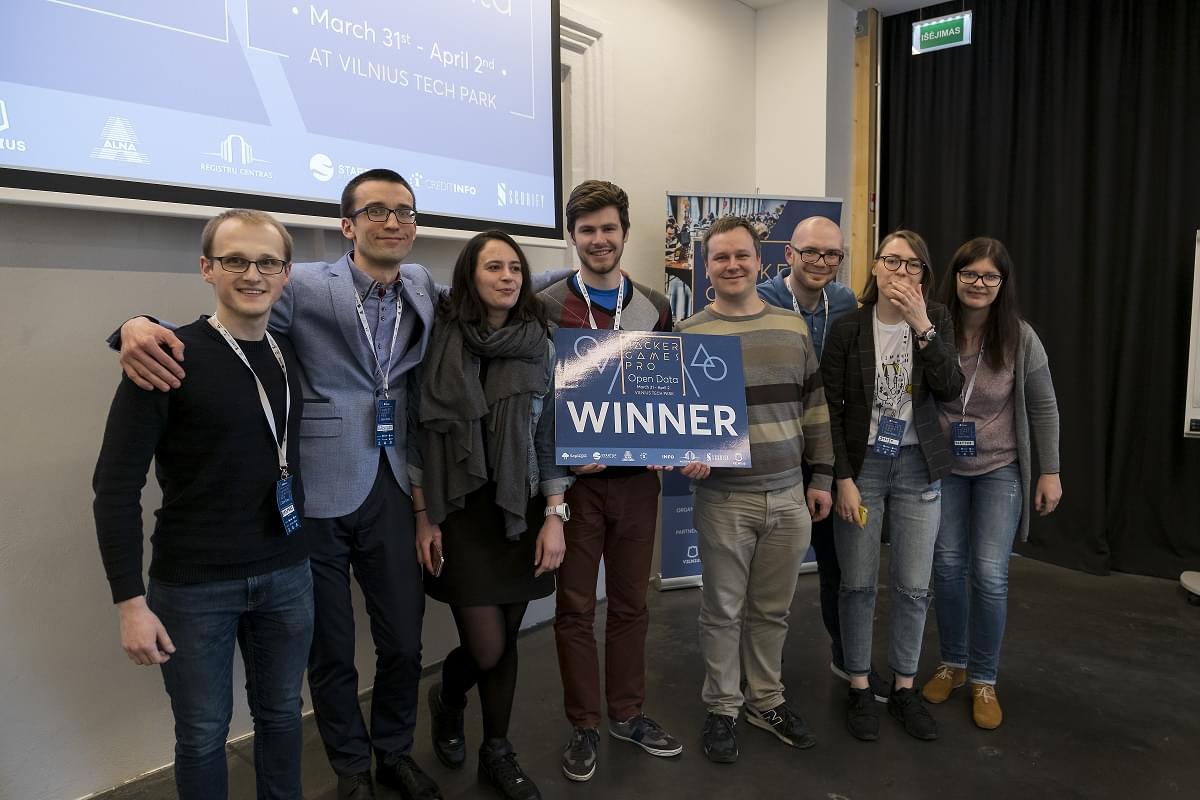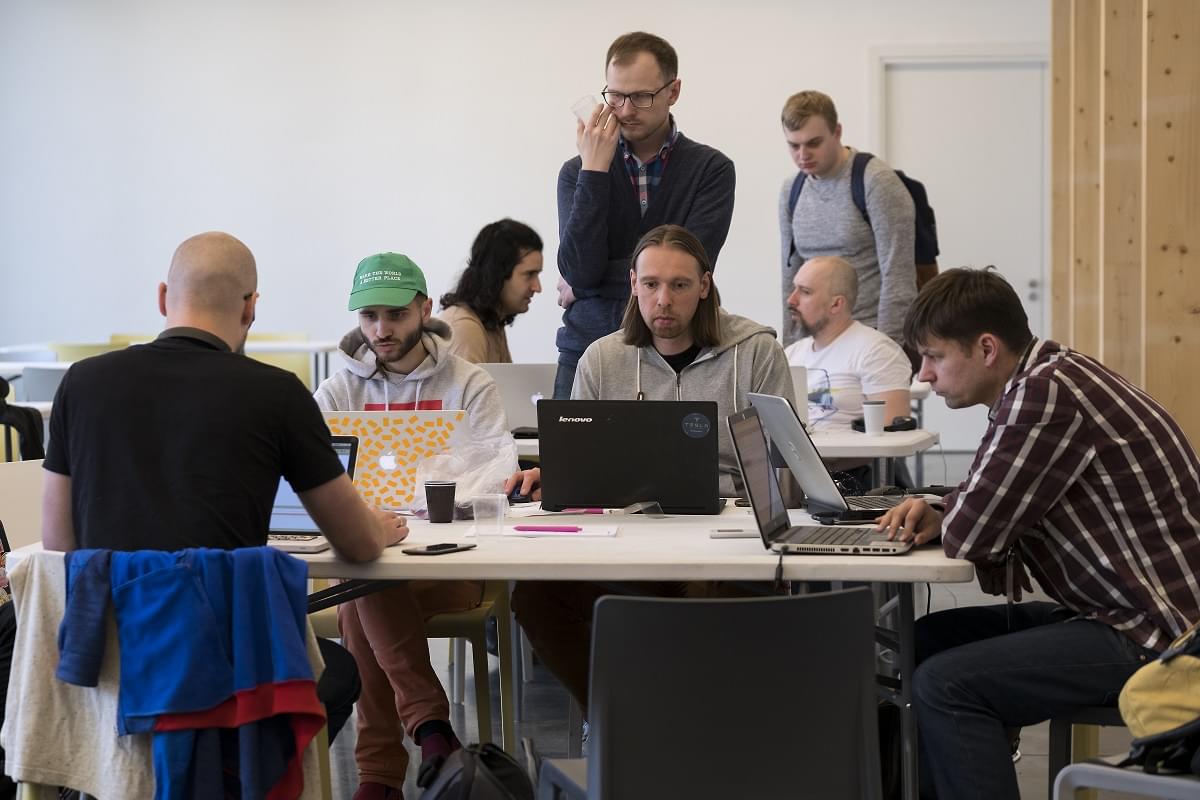Hacker Games Pro: Discover Projects Made During the Weekend
2017
Apr 05
Apr 05

On 31 March – 2 April, Vilnius Tech Park hosted the first event of Hacker Games Pro, where which programmers, designers and other specialists developed open data-related projects. Among the created projects was an app, allowing to book a charging station for an electric car, a system to evaluate real chances of getting to public kindergartens in Vilnius and an electronic car accident declaration platform.
The first event of Hacker Games Pro was dedicated to open data technologies. Specially for the event, impersonal data was prepared by Vilnius city municipality, Centre of Registers, credit bureau Creditinfo and Sodra, Vilnius Tech Park writes in a press release. Each team had a task – to develop a prototype of their business idea within 48 hours and present it to the jury.
In Lithuania, creative workshops, known as hackathons, take place since 2013. However, according to the organisers, Hacker Games Pro is oriented not only to the participants' creativity; the main aim of the new hackathon – to foster long-term cooperation between startups, major companies and public sector organisations.
“Usually, technology enthusiasts participate in hackathons to take their business idea off the ground. Unfortunately, after the competition event, even the best ideas often are abandoned due to lack of knowledge, experience or resources. By organising Hacker Games Pro, we aim to draw the attention of large companies and the public sector organisations to the technology available in various fields and opportunities to become part of the development of those ideas," commented Darius Žakaitis, Executive Director of Vilnius Tech Park.
Participants had an opportunity to develop their own business ideas or to build mixed teams with specialists from partner companies: Centre of Registers, Creditinfo and Alna Software. Also, teams were advised by various mentors – startups professionals, investors, open data specialists.
Business ideas, that were presented at the end of the competition, were oriented to the current issues in Vilnius. For example, one of the projects – a website called Queue: Kindergarten Chances, is a tool for parents of preschool children to assess chances of getting into selected kindergartens in Vilnius. According to the authors, every year the number of registered children exceeds the number of actual places in kindergartens, so residents are faced with uncertainty, whether they will be lucky to get to at least one of the selected educational institutions. The system would help parents to evaluate opportunities to enrol to selected kindergartens in advance and to take the necessary action: hire a nanny, choose a private education institution or just register for less popular, but more remote kindergarten in Vilnius.
The algorithm was developed using publicly available data of Vilnius city municipality and adapting such officially used criteria as the number of children and family income. According to the developers, these criteria allow the system to generate highly accurate forecasts.
Another business idea, which is relevant to Vilnius residents – an application called Powah for e-car owners. According to the author of the idea Rokas Danusevičius, in Lithuania, there are more than 1000 e-cars, but only a few publicly available car charging stations. Moreover, after choosing one of public charging stations, the driver cannot be sure if the station is free upon arrival. He is convinced that the number of e-cars will grow inevitably and infrastructure will expand, so their search tool will be needed. Users of the app Powah will not only see all the publicly available stations, but also will be able to pre-order charging time, and pay for the service in the future. This tool will also be available for individuals who have personal charging stations and wish to rent them to other drivers.

However, the team called #Atsitiko was selected as the winners. They created an electronic traffic incident declaration platform. The members of the team were specialists from Alna Software and other participants of the hackathon. The system allows you to quickly and easily provide information about the car accident: weather conditions and other circumstances, the exact location of the incident, damage to the vehicle. After adding the information about a car accident to the system, it is automatically transferred to the insurance companies. In addition, the app will support integrated search function to help find a nearby garage, roadside assistance service, taxis and even a psychologist for advice.
The team was granted an opportunity to development their business idea further at Vilnius Tech Park for three months, using the park’s infrastructure and help of various mentors, free of charge. Furthermore, if the project reaches certain goals, the accelerator StartupHighway will pay the initial investment.
Hacker Games Pro: Open Data was organised by Vilnius Tech Park and Startup Lithuania. Also, a group of organisations contributed their data, equipment and expertise: Vilnius city municipality, Centre of Registers, credit bureau Creditinfo, Scorify, Sodra and Alna Software. In total, at least four hackathons, uniting startups, innovation enthusiasts and large companies, and oriented to different sectors of innovation, will be organised this year.
